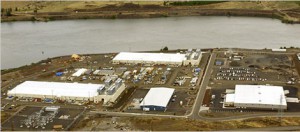Internet Data Centers: The Cloud’s Carbon Footprint
If you haven’t heard of the term “cloud” or “cloud computing,” you will hear a lot about it in the near future. Essentially, it’s just another word for the internet. The term specifically refers to the idea that the internet has become a “cloud” of information accessible anywhere with the introduction and growth of mobile devices. The sources of this “cloud” are the giant servers these major companies run to send out information using incredible amounts of energy.
Major companies in the technology industry are facing harsh criticism about the energy consumption of their data centers. Giants like Facebook, Google, Apple, and Yahoo have made some of the most significant advancements in technology, but have left massive carbon footprints in the process.
The actual sources of the harmful emissions are the coal-burning utility companies providing these technological giants with the energy to power their servers, but we are all to blame for this rising problem.
According to Greenpeace, data centers like these will use more power by 2020 than Germany, France, Canada, and Brazil combined.
Although these companies are technically responsible for this energy consumption, aren’t we, the users, really at fault? In reality, they are only providing us with the social networking and live video we have grown to love.
It is too late to slow down this cloud of information. Even though we are all at fault, it seems that only these companies can do much to solve the problem. It is obvious that people will object to using their technological tools less, so it is up to companies like Google and Facebook to take responsibility for their energy use.
According to a BBC article, Microsoft claims that its data center in Washington runs on 100% Hydropower, utilizing the Columbia River Basin. Yahoo uses a hydroelectric power plant in Buffalo, proof that harmful emissions can and are currently being avoided.
Powerhouse companies like Facebook tend to focus on solving problems with energy efficiency as opposed to improving the initial source of that energy. While coal has proven efficient, it doesn’t work well into a long-term plan for our planet. If some companies can utilize earth-friendly forms of energy, all of them can.
Ironically, a group has formed on Facebook that includes over 350,000 members who are urging the social network to stop using coal-based energy suppliers and to make the transition to healthier practices.
Any company should realize that quick profits combined with bad results for the environment can hinder that company’s success. On the contrary, consistent progression combined with safe, healthy results will lead to long-term success.
Using coal might immediately increase productivity relative to cost, but it can also go a long way in killing a customer base.
Read more from Greenpeace about Cloud Computing: “Make it Green: Cloud Computing and its Contribution to Climate Change.”
http://www.greenpeace.org/raw/content/usa/press-center/reports4/make-it-green-cloud-computing.pdf
Read more about the Data Centers: BBC News: “Greenpeace issues warning about Data Centre Power”
http://news.bbc.co.uk/2/hi/technology/8594431.stm


Thanks Mason,
It would be nice to live in a place where companies who did not follow certain environmentally friendly protocols could be shut down, but unfortunately that doesn’t represent the world we live in.
With that said, what can we do about companies who choose to damage the environment? Many major corporations have the ability to use their own money to create more environmentally friendly structures and operations, but choose not to. An example of this is Facebook choosing to power their newest data center with an energy company that burns more coal than the U.S. average.
What do you think should be done to persuade, or even to force, companies like this to change?
Its important that we all start being conscious of our environment. Our technology is getting more and more sophisticated and it needs more and more energy to opperate. Obviously it would be wise to only support companies that make an active step toward being environmentally friendly and shut down companies that refuse to use a new way of thinking to ensure a healthy lasting planet.